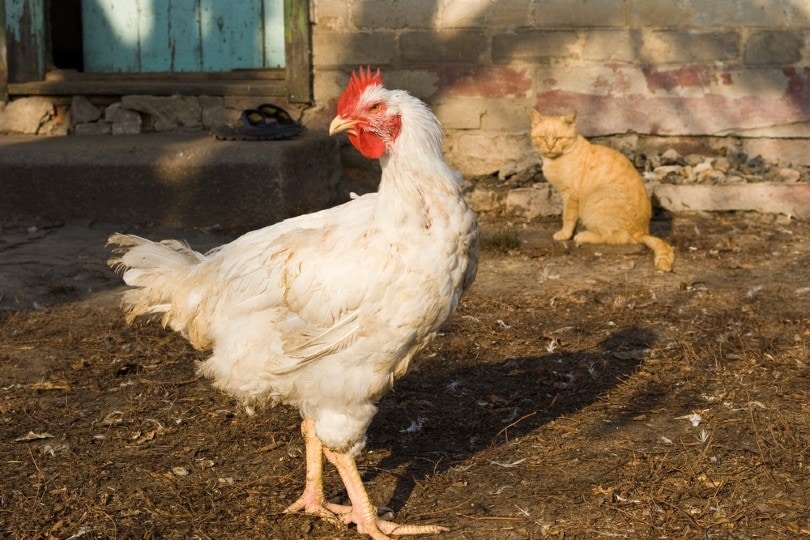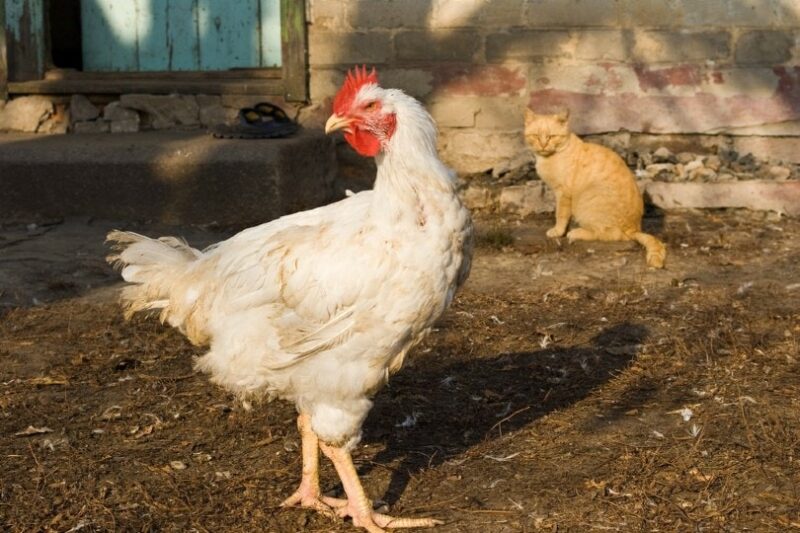Keeping chicken flocks has become increasingly popular throughout the United States. Many urban homesteaders and families interested in having fresh eggs are keeping chickens, often introducing the birds into environments populated with cats.
Cats are curious creatures that love to investigate, explore, prowl, and pounce. They’re predators, after all, and stalking, chasing, and ultimately killing birds is deeply etched into their DNA, which can be a massive problem if you have chickens!
Felines typically won’t bother fully grown chickens, and the birds tend to scare off marauding kitties quite easily. Still, many chicken farmers have trouble with cats wreaking havoc on, tormenting, stalking, and even killing chicks that are just the right size to interest prowling felines. Read on for seven easy ways to keep cats away from your chickens.
The 7 Tips to Keep Cats Away From Chickens
1. Install Wire Enclosures
Wire enclosures are quite effective in keeping predators such as cats away from your chickens. There are two options available: commercial, prefabricated chicken runs that often come with everything your birds need to enjoy their environment and DIY fences you can build yourself.
Chicken runs are like all-inclusive bird homes. They’re great if you don’t have much time or the expertise to build your fencing, and they are designed to be easy to assemble. There are even mobile options that make it easy for you to move your chickens’ home from place to place in your yard. DIY fencing enables you to construct an enclosure just right for your yard. All fenced enclosures need to be covered to be effective at keeping cats at bay.

2. Opt for Larger Breeds
While most cats naturally avoid fully grown chickens, some breeds have adult birds the right size to tempt predatory cats. Small birds, such as Skiles and Old English Game chickens, should be avoided if you have a cat predation problem. Consider larger breeds, such as Jersey Giants, Australorps, and Brahmas, that are sizeable enough to repel domestic cats.
3. Install Motion Sensor Lights and Sprinklers
Cats enjoy getting out and about around dusk and dawn, but feral cats will hunt whenever the opportunity presents itself. Many cats also enjoy a good nighttime prowl for prey. Motion-sensing lights take advantage of this tendency and essentially startle prowling cats, discouraging them from continuing their chicken-stealing plans.
Once installed, the lights will illuminate your chicken coop when there’s motion around the perimeter. Not only will the lights startle any prowling cat, but they’ll also alert your birds and take away a stalking cat’s element of surprise, increasing the chances your birds will be able to repel a cat attack. Unfortunately, some cats get used to motion-activated lights, making the products less effective over time. You can invest in a motion-sensing sprinkler system designed to annoy kitties by spraying water when triggered.

4. Add a Rooster to Your Flock
Roosters tend to be much larger than hens. They typically have larger chests and more muscle mass and demonstrate more aggression. They also have sharp, dangerous spurs above their toes that can inflict serious harm on attacking animals, making them much harder for cats to prey on. Roosters can make a ton of noise, though, so most urban chicken farmers do not keep roosters.
Roosters will also crow to notify the flock of danger. Unfortunately, roosters often become aggressive toward other creatures, including people, so think twice before introducing one to an environment where children might accidentally encounter and be injured by an angry bird. In addition, they aren’t legal in all localities because of the noise and aggression issues, so make sure to verify the permissibility of rooster ownership before running out and purchasing one to protect your flock.
5. Get a Dog
Farm dogs are often great solutions for protecting chickens and other animals from predators, including cats. Most livestock protection breeds tend to be large, however, making them an impractical choice for urban homesteaders and those raising chickens in cities or on small plots of land.
Still, adopting and training a livestock protection dog can be a great option if you have enough space and patience to engage in the required training. Popular livestock protection dogs include Great Pyrenees, Anatolian Shepherds, Komondors, and Polish Tatra Sheepdogs. Try to purchase your guard dog from someone who specializes in breeding poultry guard dogs; it’ll make the training process easier.

6. Pick the Right Spot
While setting your coop up under a tree may seem like a great way to provide your birds with shade, it can increase the chance of a cat attack. Kitties love to climb trees, and they love to survey the land from high perches. Not only will having nearby trees lure felines to the environment, but it’ll also give them the perfect vantage point from which to devise a plan of attack. If you’re dealing with a particularly clever cat or a breed with enhanced climbing and hunting instincts, the cat will likely climb the tree and drop down into your chicken coop.
7. Invest in a Brooder Cover
Cats are most likely to go after chicks, as they’re small, defenseless, and a bit awkward on their feet. Many chicken farmers keep their chicks in brooders for the first 6 weeks after hatching to provide warmth and a relatively safe environment. While using a brooder is a great way to minimize the chances of a cat making off with one of your vulnerable chicks, you’ll need to take an extra step to keep the cats away: Cover your brooder, so there’s no way for sneaky felines to jump into your enclosure.
While you can always purchase a brooder cover that keeps the neighborhood cats out, it’s also simple to create your own. All you need is fencing or mesh to place over the top of the brooder.
Final Thoughts
Raising chickens is a great way to get fresh eggs, and as an added benefit, you’ll know your laying hens were treated well and not subjected to the horrors of industrial poultry farming! No matter where you live, protecting your birds from predatory animals, including cats, is always a challenge. Although most cats won’t bother grown birds, they will happily make a snack of a chick or two. By implementing one or two of these solutions, you can keep marauding felines away from your chickens.
Featured Image Credit By: Yuriy Kulik, Shutterstock












